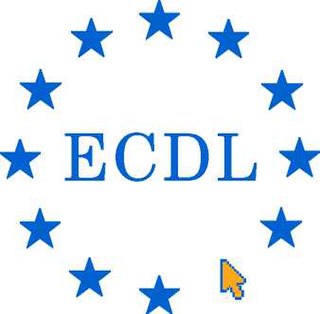Software engineering is a systematic engineering approach to software development.

A system administrator, or sysadmin, or admin is a person who is responsible for the upkeep, configuration, and reliable operation of computer systems, especially multi-user computers, such as servers. The system administrator seeks to ensure that the uptime, performance, resources, and security of the computers they manage meet the needs of the users, without exceeding a set budget when doing so.

International Computer Driving Licence (ICDL), formerly known as European Computer Driving Licence (ECDL), is a computer literacy certification program provided by ECDL Foundation, a not-for-profit organisation.
The International Federation for Information Processing (IFIP) is a global organisation for researchers and professionals working in the field of computing to conduct research, develop standards and promote information sharing.
Linux Professional Institute (LPI) offers three different certification tracks. The core certification program, Linux Professional, contains three different levels addressing distinct aspects of Linux system administration. The organization also offers an introductory Essentials program for beginners in Linux and open source, as well as an Open Technology track for professionals working with additional technologies such as DevOps and BSD.
The Oracle Certification Program certifies candidates on skills and knowledge related to Oracle products and technologies.

Universitas Terbuka is Indonesia's state university and employs open and distance learning (ODL) system to widen access to higher education to all Indonesian citizens, including those who live in remote islands throughout the country, as well as in various parts of the world. It has a total student body of 1,045,665 as of 2019/2020 according to Indonesia's Ministry of Education Higher Education database. According to a distance education institution in the UK, which published "The Top Ten Mega Universities", UT-3 ranks closely with universities from China and Turkey.
The Australian Computer Society (ACS) is an association for information and communications technology professionals with over 48,000 members Australia-wide. According to its Constitution, its objectives are "to advance professional excellence in information technology" and "to promote the development of Australian information and communications technology resources".
Health information management (HIM) is information management applied to health and health care. It is the practice of analyzing and protecting digital and traditional medical information vital to providing quality patient care. With the widespread computerization of health records, traditional (paper-based) records are being replaced with electronic health records (EHRs). The tools of health informatics and health information technology are continually improving to bring greater efficiency to information management in the health care sector.
The following outline is provided as an overview of and topical guide to information technology:

The University of Nicosia was established in 1980 and its main campus is located in Nicosia, the capital city of Cyprus. It also runs study centres in Athens, Bucharest and New York.

The European Certification of Informatics Professionals (EUCIP) is a professional certification and competency development scheme, aimed at informatics professionals and practitioners. EUCIP, which originated with the Council of European Professional Informatics Societies, is offered in a range of European countries through national computer societies. The EUCIP certifications are maintained by ECDL Foundation.
The Institute for the Certification of Computing Professionals (ICCP) is a non-profit institution for professional certification in the Computer engineering and Information technology industry. It was founded in 1973 by 8 professional computer societies to promote certification and professionalism in the industry, lower the cost of development and administration of certification for all of the societies and act as the central resource for job standards and performance criteria.
The Agency for Information Society of Republika Srpska is institution responsible for monitoring the development of information society and promoting the use of information and communication technologies. Supervision of the agency, on behalf of the Republika Srpska is performed by the Ministry of Science and Technology.
The Computing Technology Industry Association (CompTIA) is an American non-profit trade association, issuing professional certifications for the information technology (IT) industry. It is considered one of the IT industry's top trade associations.
The College of Engineering Vadakara (CEV) is an engineering college in Kozhikode district of Kerala, established in 1999.
The following outline is provided as an overview of and topical guide to software development:
Information and communication technology (ICT) in Kosovo has experienced a remarkable development since 1999. From being almost non-existent 10 years ago, Kosovar companies in the information technology (IT) domain offer today wide range of ICT services to their customers both local as well as to foreign companies. Kosovo has the youngest population in Europe, with advanced knowledge in ICT.

EXIN is a Dutch company which certifies IT professionals worldwide. In addition, EXIN accredits organizations in the field of ICT training and the development of ICT training materials. EXIN is active in more than 165 countries and provides examination in many languages. Since EXIN Was founded in 1984, it has assessed and certified more than two million professionals. EXIN’s headquarters are situated in Utrecht, The Netherlands.
The Information-Technology Engineers Examination is a group of information technology examinations administered by the Information Technology Promotion Agency, Japan (IPA). The ITEE was introduced in 1969 by Japan's Ministry of International Trade and Industry (MITI), and it has since changed hands twice, first to the Japan Information Processing Development Corporation (JIPDEC) in 1984, and then to the IPA in 2004. At first there were two examination categories, one for lower-level programmers and one for upper-level programmers, and over the years the number of categories increased to twelve as of 2016.





